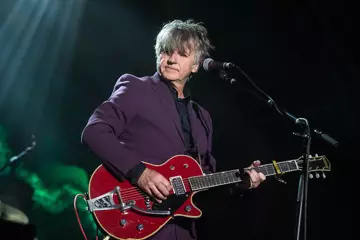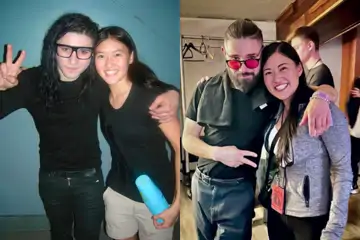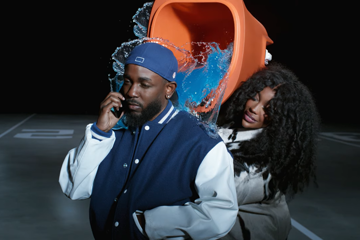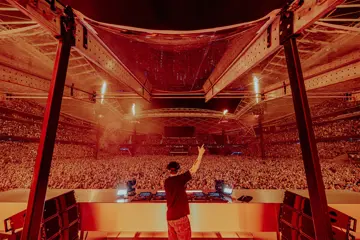"Hello God. I'm here, I'm ready." In a warped and disconnected surrender, this is the line that opens Melbourne audiovisual duo friendships' second album, FISHTANK. Through a vocoder, it signals the start of what is to come on opening track 'come on in precious', heralding the start of a a heavy journey ahead. FISHTANK, which can be described not just as an album but a framework one could follow on said journey, is not for the faint hearted.
Created after an extended period of disconnection between the pair, Nic Brown and Misha Grace reformed after not even really speaking for a long while. They'd just wrapped up extensive touring off the back of their acclaimed debut, Nullarbor 1988-1989, and after a particular show, just went their separate ways. What would follow is a period not just of the severance of their creative relationship, but similar paths and experiences surrounding loss of themselves and the battle one must undertake to return. After a chance encounter brought them back together again, the pair were struck at how perfectly suited the art they were respectively creating matched, and they once again hit their creative stride together, resulting in the sonic behemoth of FISHTANK.
Not only is FISHTANK thematically heavy, soundtrack the journey down into the abyss and out again, it is technically immense too. Each of the eleven songs, or "movements" as described by the duo, has their own respective visual accompaniment, and each movement is its own mini-soundscape to get well and truly lost in. Ultimately, it's about an hour of full-bodied experimental avant garde audiovisual art, mapping the voyage ahead through complete demise and destruction, the total weightlessness that follows severance of self, and the clawing back to the top despite what you've just overcome. It's a no-holds-barred, warts and all narrative arc, depicting in grotesque, frenetic, terrifying, chaotic and ultimately liberating detail.
friendships has never done anything half-heartedly. They once cancelled a set at BIGSOUND because the technical rider wasn't able to be fulfilled, and doing a show without what they needed was not an option. This isn't to say they are by any means divas or have inflated senses of importance. Instead, what it does say about them is that their commitment to their art, their dedication to what they're offering and the respect they hold for what each other brings to the mutual table is so strong, they couldn't possibly go ahead doing anything other than what they were there to do. From even prior to Nullarbor's release, friendships have repeatedly overwhelming rejected traditional constraints, opting instead to go in favour of artistic authenticity and genuine exploration of their mediums and by doing so they've not only just crafted out a little space of their own, they've created an entire alien planet for themselves.
Don't miss a beat with our FREE daily newsletter
There is so much going on throughout FISHTANK, from the cacophony and dissonance to the moments so sweet and peaceful it catches you off guard. Similarly, the visual aspect of friendships is equally vast and varied, delivering further depth to the world of FISHTANK, bringing it further to life. It's not a record which is easily described, which is very fitting coming from a duo who have repeatedly bucked any and all predictions and categorisations. It's also fitting then that their opus, their finest body of work yet, would be FISHTANK — a desolate, industrial wasteland; a weightless moment of realisation deep in the ocean; a final moment of hope as you climb back out of the hole you fell in.
Here, I speak to Nic Brown prior to the unleashing of FISHTANK, where we discussed everything from COVID-19 isolation to string theory. While he also might not have the answers to the meaning of life, he and Grace now have a framework which can mean many things all at once. To be human is to be gloriously messy, and throughout anyone's life there are going to be times in which we lose touch with ourselves. Whether we choose the path of complete descent into chaos or we manage to straighten up might be out of our control, or it might not be. FISHTANK doesn't purport to have the answers, it's not a guided tour through the underbelly of humanity. Instead, it's a framework written from experience of making it out the other side, and making it out together. In a time when connection is harder and harder to achieve, friendships not only managed to find theirs again but fortify it more than ever, and by doing so deliver their strongest, most defined and most engaging body of work yet.
Your new album is out so soon! How are you feeling about it?
It's fucking wild. I feel this kind of body of work for Mish and myself, I'm just so happy with everything that we've put together. It feels like one of our more considered long-form bodies of work. A little more cohesive from start to finish. The concept started just from conversation as opposed to, "You do something visually and I'll do something from an audio perspective and let's see where these kinds of mediums meet." It more started in conversation and then grew this world from there and then, I guess if it was in this world, it was much easier to soundtrack and contextualise what that is, if you're inside of it.
To me, it kind of feels almost like an expose of identity in the journey that you've taken from losing yourself, realising that you've lost yourself. And then, the climb back out of the hole. It's quite fearless when looking at everything in a big picture way because you've got moments of anxiety and claustrophobia, you've got abyss, you've got clarity and chaos. Your music has kind of always had this quality over the years, but it's very much amplified on this record. I wondered, what made you want to go all the way on this album?
It kind of started with these conversation or maybe even lack of conversations, [it was] this communication breakdown between Mish and myself. We were going through these motions of starting to lose self and lose track of our art and our practice and who we were. [I was] just starting the kind of spiralling, losing track of who I am and what I am. I initially wrote this in reaction to myself, but also my relationship with Mish, which was somewhat falling apart. Then, when we did come together and work on mending this relationship, this whole project, this concept was the core to that. It was this conversation piece of okay, so we've gone through this spiral of I guess somewhat heavy depression, which is human. That kind of spiral down is absolutely something that everyone goes through. You do go through these moments of losing yourself or losing track of who you are. For us, it was like, let's make this world and make this kind of arc or journey of what that process is, and create it in this fantasy world where it's not just isolated to my experience and it's not just isolated to Mish's experience. It's isolated to a human experience, and then, set in this like fancy world where it's you versus you and it's all happening within your mind, but it's this blurring of reality and your perception of reality and your fantasy version of reality, and the framework [of that] is "FISHTANK". For a lot of our stuff, we were definitely taking cues from what we heard and saw. But for this one, it was like very insular and almost incestuous. It was just us feeding into each other and just creating something that once we created this world, it seemed easier to make the sounds and feel and look of this place because it was this coming. It was like bred from this kind of FISHTANK world.
Most of the time we spent not creating, it was just spent talking. We'd sit there and we'd smoke and we'd drink and we'd just talk. If you were a fly on the wall for some of those conversations it would've sounded like totally manic. It was insane. It was just talking about this timeline and mapping out this timeline, and then, talking about the hero arc of you going through this journey. [Laughs] It was kind of insane. But it was totally necessary to form this place and create that world and then everything else seemed easy. Writing the music was easy and doing the visuals was easy and it was cohesive because we just knew where it came from.
Looking back at your previous creations then, do you think that this was easier to make than Nullarbor or songs before that? Maybe because of the cohesion and because you had so clearly communicated with each other about where this record kind of sits in the world?
Yeah, I think so. I think Nullarbor and then like previous works — I still adore those bodies of work — but they were taking these weird, very obvious cues and cue points from a global understanding of music and genre and creating these melting pots of genre and then using it lightly to a concept. Those were formed from looking out and looking at the world, whereas this one, the concept came first and then the breeding ground was there. I guess Nullarbor was probably trickier to write. I mean, it was also working with other artists, which is always tricky. [Laughs] I do love collaboration, I'm just not very good at it.
It almost sounds like you don't really have a need for collaboration and sometimes people really thrive and need extra parties feeding into it where the collaboration between you and Mish is so strong that there's no real need for a third party to enter because there's already so much going on between the two of you.
Yeah! It's like a core understanding. If Mish gives me something or I give Mish something or we sending demos back and forth. Mish always gets it, and Mish always understands where I'm coming from and vice versa. I've never really had that collaboratively really ever before. I mean, people that we've collaborated with before, it can absolutely hit a level. But yeah, with Mish, the relationship that we have, it just seems easy.
You touched on the learned helplessness theory in 'How I Used to Paint'. Now, I gave it a quick Google and I think I've managed to grasp the concept. It's the thought of being totally out of control of your circumstances, which leads you to feeling helpless to change it. Am I on the right track there? Can you talk to me about a bit about what this theory means in the context of this album?
This was a concept that I was throwing around with Mish. I don't even know really where I'd read about it found out about it. It was also in response to Mish's living with epilepsy. They did it with kind of two dogs, I'd have to go back to it but it was a fairly brutal experiment. But I think an alarm sounds, and then [one dog] gets a shock. The other dog, the alarm sounds or the alarm doesn't sound, then it's a shock that happens. But either way, the dog that just gets used to the shock that'll come and will come every time, that just becomes the norm. And that becomes normalised. I kind of related that back to Mish's living with epilepsy and it's almost become this feeling that's become normalised. Like, "Seizures are normalised and these things are just something that I'll have to kind of go through." If you're used to pain, or something that you're expecting it to happen, that becomes your default and your new normal. Your default feeling is helplessness, which is horrible. Because it's just a default middle space that you've now taken on, and you can have so much more than that. It's just like your brain telling you that this is you now, and it shouldn't be like that. But sometimes, when you get that far into your head and when you get that far back and you lose self or lose track of where you are, like with pain or depression, or constantly feeling sad can become your norm. Those neural pathways are then strengthened, and then that's where you live. I guess if you keep going further back than that, it can kind of build and build and then that becomes you. It's something that we kind of all go through, not to that extent. I found it a really concept, and I found it could translate even to your mental state or to something like epilepsy.
In that same concept then, you almost become a self-fulfilling prophecy. We as all humans go through periods of that helplessness and of just being like, "Well, I guess this is fucking it. I guess this, this is just it for me and I just live here now, and this is how it has to be." It's that kind of turning point that you guys moved the record into that is that moment where you're like, "Oh, actually I can change this." Is that kind of where the album kind of moves through to, from 'How I Used to Paint' into the rest of the record?
Yeah, absolutely! I guess from even just a literature sense, I love that thought of the hero or the protagonist or whatever, the person moving through that arc, that kind of hero arc, the classic story of why they cross from the known into the unknown. They cross that threshold. They go through this series of battles and they meet people along the way. They grow until they can get to this point where they can overcome and then go back. I wanted the whole thing to feel cyclical, like you were moving through this and growing. Even if it was getting harder and harder or sadder or more intense, you're growing and your armour is building up. You are shedding those parts that got you to that point, so you can move through and then kind of cross over and cross back. And then, you're like, "I'm stronger, bigger, powerful. I'm more than when I went on this, when I slipped down this path." I wanted it to feel hopeful, but I guess just being human, the whole process is quite confused. Human emotions are quite complex. You can feel hopeful and total isolated or totally nihilistic at the same time. I wanted it to have a mixed feelings of like, "I'm saying this, but I'm also kind of like feeling this." There is moments of confusion, but as you're kind of growing and sucking and feeding through it, it should hopefully feel human. At the ending, or the end of the cycle, I do want that to feel hopeful and like a closure or closing, but I'm also just not sure! [Laughs]
It's just so human, you know? Being human is confusing and it's messy and it's not linear and you go two steps forward and then you go sixteen steps backwards, and then you kind of start to figure it out a little bit, and then you reconsider everything you've ever learned in your entire life. That's what I was kind of getting out of this record. A really particularly striking moment for me is the song, 'was i good'. To me, it feels like that moment where you've kind of spiraled out of control a little bit too far, you're officially lost and you have that realisation of, "Fuck. How did I even get here?" You describe it as wanting the listener to feel like they're deep under the ocean. "The abyss, the state of limbo between the loss of oneself and the discovery of another." I wondered Nic, do you believe in the concept of having multiple versions of ourselves? Or do you think, is there one self, which continually evolves over time? I know that's a really deep question, but I want to get into it.
It's really interesting. I was having these discussions with one of my friends, Ben, and for a long time, I thought that human existence and our path was quite linear, even to the point where the idea of choice is illusion. Because you're always constantly moving through this pathway that if you were to go left or right, there really was no left or right because you were always going to kind of choose that one path. But I don't think I believe that. I don't think I believe that time is linear, because I feel like that is just what I've been exposed to: this one version of time and one version of me and one version of space. But I feel like there has to be multiple. I feel it'd be silly if I was limiting myself to just this one strain of time. There has to be more. And I mean I'm really basing that on nothing, but I'm coming from pre-determinism to now string theory or multiple realities. Like I've come a long way, you know? [Laughs]
Revisiting these times can be really stressful to say the least. Has going back and mining these experiences that you've both gone through for your art, given you any kind of catharsis? Has it made you question everything that you've ever ever learned? How are you now on the other side of this creation?
The cathartic moment was making it. In the process of it being created, that was the moment of healing. That was like, "Okay, I feel better for doing this and for putting this together and just to kind of map out this process." Even when it's just like a light listen in the car [there are times when I'm like,] "Oh, wow, this is fucking sad." At points it really kicks you in the gut and it's like, "Ow, that hurts. Nic, why'd you do that?" Even thinking about it when we were writing it, I did want it to feel like a framework that you can go back to and you can track your journey. If I do get to that point again where I feel like I am losing myself, it's now just like you just take yourself through the motions and you just have to grow and build and learn from it. I hope I'm a little more conscious next time I go through something like this. It's still sad and emotionally driven. The biggest moments for me was putting it together. I think for Mish as well, that was the healing. It was actually just bringing us closer together after being so far apart and not quite friendly at all to then falling back in love with each other and each other's work. In the end it has been quite healing.
There's a line that you wrote when describing 'duet for a crying chihuahua dancing for a wealthy ring of crows', which is the best song title ever. You wrote, "Yeah, it's painful, but it's necessary." I feel like that sums up the entire premise of FISHTANK and of friendships too and where you're at now. It's also incredibly universal. We all have to go through pain to emerge as new versions of ourselves. Looking at what you went through, not on your own in the creation of this record, but maybe perhaps your whole fucking lives and together as a duo, is FISHTANK, somewhat representative of life itself: just one big cycle of loss and rebirth and we just keep going until die?
I hope not [laughs]. I guess the framework can be used in different kinds of scenarios and situations, and that feeling of having obstacles and having to overcome on a micro or macro scale, I guess it can be utilised. The whole order of things being kind of cyclical is applicable to life. This was initially intended to be the spiral backwards into self, but it totally can be like the challenges that you face in your life everyday, whether it's an emotional challenge or a physical challenge or mental challenges. I guess that it can be applicable to anything, but I don't want to give myself that kind of credit, you know? [Laughs]
[Laughs] You're too humble!
I hope the process itself and the framework is helpful to people. There was always the intent there for it to end hopeful or that by the time you get to the end of it you do feel healed. I hope people get that out of it. It is quite a heavy body of work and quite painful. I do hope people get through to the end and just go, "Okay. I feel better."
FISHTANK is out now via Dot Dash/Remote Control. Buy/stream here.
Interview by Emma Jones
Image: Supplied
SEE ALSO
PREMIERE: FRIENDSHIPS TAKES GOLDEN SYRUP OUT OF THIS WORLD WITH ‘PERFECT’ REMIX
















